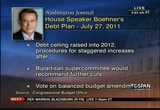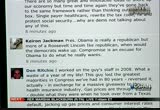tv Washington Journal CSPAN July 28, 2011 7:00am-10:00am EDT
7:00 am
interior department spending bill and deficit- reduction. and in about 45 minutes, and update on the debt negotiations. also, a look at the bond rating agency and potential for a downgrade in the u.s. bond rating. ♪ ♪ host: the house rules committee last night cast a closed rule for the debate of the budget act, which will be on the house floor today. according to the summary, the budget control act would cut and cap federal spending and require a vote on a balanced budget constitutional amendment, and facilitate the enactment of a bipartisan plan to reduce the
7:01 am
national deficit. the congressional budget office has scored the bill, saying it is within the guidelines speaker boehner has called for, where spending cuts are bigger than any increase in the debt limit. we want to talk to democrats only for the first 45 minutes and we want to talk about president obama's handling of the debt talks. how did you think president obama has done so far? democrats only. we did republicans only yesterday morning. if you are a democrat, here are the numbers for you to dial. do you approve of how president obama has handled the debt talks so far? here are a couple of headlines to give you an update on where we stand on the different debt
7:02 am
talks. "optimism builds for boehner bill." politico this morning, "house debt deal faces senate stall." finally from "the washington post", "boehner puts pressure on gop doubters." lori montgomery from "the washington post" joins us. guest: the two deals that are proposed are not that different. the bills that will go to the floor today in the house is a measure that would raise the debt ceiling by $900 billion and
7:03 am
would cut $915 billion from agency budgets over the next decade. it creates a new super committees. once we get past the debt ceiling mess, congress will appoint 12 people from the house and senate -- six from each chamber, six from each party, and they will figure out how to cut. in the senate, it is virtually the same bill. the only difference is that it would cut more spending, which republicans say is a gimmick- type of savings. it would give president obama the hold $2.2 trillion increase in the debt ceiling up front. host: according to the letter harry reid and all the democrats sent to boehner, it says the
7:04 am
entire democratic caucus and vows to oppose the boehner debt plan. "a short-term extension would put america at risk, along with every family and business in it ." every democrat in the senate has signed this letter. what is the purpose of today's house debate and vote on the new budget control act of 2011? guest: the purpose of today's debate in the house is to jam the senate and get something through the house first. there are rumors that the house could leave once they do that. you know, leave for the summer break. that would put the senate in a pretty awkward position.
7:05 am
they would either have to except to the house measure, which i think was the purpose of the letter yesterday -- to let house members know that they will not accept it. they could be faced with a situation of passing their own bill, knowing that the house is not here. the talks have been going on now since the big deal talks between boehner and obama broke down on friday among all the congressional leaders on how to fix basically one problem. that is, how long the debt limit increase we will do. they have not been able to resolve that problem. host: do you think there's a chance the house really will leave town? guest: i do not know. no one would confirm that. there were rumors yesterday, mainly from democrats.
7:06 am
republicans said they had heard nothing like that. democrats also said they would be surprised if the house would do that. it will look terrible with this crisis hanging over the nation. crisis hanging over the nation. it has happened in on other occasions. host: lori montgomery, according to the senate schedule, harry reid will be announcing the schedule at 11:00 a.m. have you heard anything? guest: i have not. when i left last night, it was not clear. they were still planning to proceed as they have been talking about for a week. that is, when the house bill comes over, they want to tilt it -- to kill it. it's not clear how they will do
7:07 am
that. will they just amend reid's bill? they want to demonstrate that it does not have the votes to pass the senate. their plan last night was to go along with the reid bill and still hold onto hope that there could be compromise with mitch mcconnell to make the reid bill acceptable to republicans in the senate so that they could put the house and the same position. host: lori montgomery, if today's bill passes in the house, what happens to the cut, cap, and balance act that was passed last week? does that go away? guest: the senate tabled it. it is not going to come up. the house bill passes, there would be a vote on a balanced budget amendment, but there is no guarantee that the balanced
7:08 am
budget amendment would pass. both bills at this point have spending caps. cut, cap, and balance -- balance was never part of that bill. it was off in the future. host: politico is reporting that the debt ceiling talks are going on between vice-president joe biden and mitch mcconnell. have you seen him on the hill? guest: biden has not been on the hill. they spoke by phone yesterday, but that is not an unusual occurrence. mcconnell is not engaged in any effort to cut a deal. they say they are 100% behind the boehner bill. democrats say they have been engaged in talks with not just
7:09 am
mitch mcconnell, but also john mitch mcconnell, but also john boehner for the entire week trying to figure this out. host: lori montgomery, thank you for the update on the debt ceiling and budget talks that are happening all over capitol hill and all over washingtonl. ori montgomery is a reporter for "the washington post." democrats only for the first hour or so. the numbers are on the bottom of your screen. do you approve of president obama's handling of the debt talks? allow 30 days between your calls. tweet orlso send us saa an e-mail. you can go on facebook and continue the conversation there. the question is there just as it
7:10 am
is written on your tv. you can make a comment and we will be reading some of those comments. we begin with a call from maryland. hi. how is the president doing as far as you are concerned? caller: i think he is doing the best that he can. he does not have the support from the republican party. i am 82. this is my first time calling. host: welcome. caller: i am making the bed every morning and watching you all. i get $611 per month and i can barely live off of it. host: are you worried about not getting a check in august? caller: yes, i am. i cannot pay my rent. if i do not get my check, i will not be able to pay my rent and buy food. host: thank you for calling in and thank you for watching
7:11 am
"washington journal" in the morning. damon, hi. how do you think the president is doing? caller: i think the president can do a little bit better. it seems like he is not as liberal as we all thought. i think he gave away a little too much. that said, it seems like there's no reason for the republicans do not accept this deal. it seems like it's the same old story with them. every time he is for something, they are against it. when he comes more than half way, they are against it. i think he is doing a pretty good job of being a centrist. host: damon, i want to go back to that. would you like to see him be more liberal? caller: yes, i would like to see him more liberal, but the country is not liberal.
7:12 am
the country is pretty centrist. the country is pretty in the middle, you know. everybody fights for the middle. republicans fight for the middle and democrats fight for the middle. most people see this deal that they want, the grand bargain, as a good thing. how can the republicans only defend -- they do not want to tax the job creators. they only want to tax 2% of the nation. i'm sure each and every republican has more of the people who make less than $200,000 in their district. host: thank you for calling in. just to pull a few articles that relate to what he said -- "ralph nader said tuesday that he will launch an initiative soon to fill primary challenges to president obama in key states."
7:13 am
"democrats feel pressure from the left in debt talks." this is from fox news. cnn poll. "drop in liberal support pushes obama approval ratings down." those are just some articles about president obama and the liberal side of the democratic party. cayuga, indiana. bill, you are on the line. what do you think about president obama's handling of the debt talks so far? caller: i am surprised he even put anything about social security and medicare in the plan. what it is -- it is just like
7:14 am
terminating all the older people. they do not care. the republicans do not care. all the laws they have passed the last 20 years or 25 years is all for the rich, all for big businesses. big businesses moved out and the government pays them to move out. this is treason. i cannot understand this. yes, i was listening. and republican on there said it is all the older people's fault. it is not the retired people's fault. we do not have a vote on nothing. then they have the drug cartels meeting with the big bankers. what is this? host: senator bernie sanders, independent of vermont, spoke on a news show recently about a potential primary challenge to a president obama -- to president
7:15 am
obama. >> millions of americans are deeply disappointed in the president, who believe, with regard to social security and a number of other issues, he said one thing as a candidate and is doing something very much else has a president, who cannot believe how weak he has been in negotiating with republicans. there is deep disappointment. my suggestion is -- i think one of the reasons the president has been able to move so far to the right is that there is no primary opposition to him. i think it would do this country a good deal of service if people started thinking about candidates out there to begin contrasting what is a progressive agenda, as opposed to what obama is doing. host: "democrats. 2ggle room on obama's august
7:16 am
7:17 am
jobs with companies that are willing to take losses to make sure american people go back to work. as opposed to people who have lost a small business because of this crisis, i would still like to see people working, even if it is something as small as a convenience store. i think the president has done a great job with trying to make americans believe and understand that this is going to take a long time to get out of because it took such a long time to get into. if we work together as a team, we can see what he is trying to tell us. we have got to work together and stop separating ourselves, like the republicans want us to do. they want us to think separate, but we are americans. we all have to understand that there's no separation in
7:18 am
america. we are one nation. we are one nation that believes in each other. i think we need to let our congress people know that we do not like this separation business that republicans are trying to thrust upon us. we do not want to be separate in our love to each other. host: we will leave it there. thank you for calling in. jill posts on facebook -- host: again, you can make facebook comments come as well, and continue the conversation on president obama's handling of the debt talks. oak harbor, washington. marck, you are on the air.
7:19 am
good morning. caller: good morning. in my view, the president's handling has been practically perfect in this debt crisis. he has done a good job of bringing people together and not demonizing the public. host: thank you. an email -- and from katrina in san francisco -- east jordon, michigan. cathy, you are on the air. democrats only for the first 45 minutes. hi. caller: this situation with nobody coming to an agreement is making me crazy. i have several points. one, regarding all the debt and
7:20 am
raising the debt ceiling, i would like to see people finally get down to what the average american is living on their budget. in our situations, it is a yes or no question. can i afford to fill up my tank this week? this week? no, i cannot, so i put in a half a tank. i would like to see things like -- can we afford the war? no, we cannot. bring them home. the government owes money to social security. pay that back. i am within about 10 years of retirement. host: with those points made, how do you think president obama is doing in handling the debt talks? caller: in handling the debt talks, i think he is very diplomatic, but the outcome is
7:21 am
the same. host: pennsylvania, you are on the air. caller: how are you doing? i have a few comments. even president obama's is saying [inaudible] is there ourselves as retirees, our children, or our grandchildren. will ruin the economy even worse than it is. if there is another deadlock, i think president obama should use the 14th amendment thing and just pay our bills. these are bills that were already incurred. we have to pay them. we have to pay our bills at the kitchen table. the kitchen table thing, too, is another one. when ronald reagan's recession
7:22 am
or depression -- we thought it was a depression because we did not have a job. my husband did not have a job for two years. i had to go out and clean schools and practically scrub floors just to have enough money to keep food on the table. host: thank you for calling in. now the front page of "the washington post" has this story. "working to reassure the party base," by peter wallsten.
7:24 am
again, that is in "the washington post" this morning. tonya from detroit, how do you think the president is doing in regard to the debt talks? caller: i think he is doing great considering the circumstances. people keep saying obama's giving up too much. i do not think so. i know obama's is not stupid. he knew that the republicans would never agree to any type of tax cut on the wealthiest people. he knew it would never go anywhere. he knows what he is doing. he is not dumb. host: this is the white house memo in "the new york times" this morning. "president on sidelines in critical battle over the debt ceiling." lillian in california, you are on the "washington journal."
7:25 am
caller: i agree with president obama. i am with him. in the 10 years we had a majority in the house of representatives and we had a senate majority and president bush, we had created the deficit. when he reduced the tax on the very rich -- now they call them job creators. they always have these speeches. sorry. i have been trying to reach c- span since 1987. [laughter] host: this is your first time? caller: yes. host: that is 24 years. caller: i know. i always watch c-span.
7:26 am
it was probably before that. it was watergate. host: we were not in the -- we were not on the air then. watergate was 1973. caller: there was a hearing on c-span. host: we came into being in 1979. caller: ok, it must have been 1979. i think president obama is doing his very best. we are all americans. we should think of the country first. we should get together. host: let's hope it is not another 24 years before you get back in to talk to us. thank you for calling in. a couple more facebook comments that have been made. liz posts --
7:27 am
steven posts -- host: again, you can also post and continue the conversation on facebook. facebook.com/cspan, no hyphen in cspan. malcolm, how do you think the president is doing in handling the debt talks? caller: i think he is been very courteous, especially considering how they are constantly lying about what is going on. i think the president should do more to be instructive and to counter the points that they try to make, especially when they say things like, "holding back
7:28 am
taxes and not creating loopholes helps create jobs." that's not true. the middle class is where the job creation occurs. when middle class people have more money to spend, that creates a demand. i think he needs to address those kinds of points to put down the republican arguments. otherwise, that is important to do, but i agree with what your previous speaker said. the president does not really have to worry about the liberal side. he knows there's no alternative for them in the next election. he is definitely playing to the independents and the centrists. there might be something to be made by trying to find a viable, more liberal candidate. then again, i do not know if
7:29 am
7:30 am
conducted july 20 through 24. 68% of americans say lawmakers should be willing to compromise on the debt ceiling debate. 53% of republicans, 42% of tea party supporters, and 81% of democrats agree. 23% overall say lawmakers should stand by their principles even if the government goes into default. 38% of republicans, 53% of tea partyers, and 12% of democrats agree with that. 65% of americans overall agree that if congress does not meet the august 2 deadline, it will affect their finances. host: bethlehem, p.a. del, you're on the line. democrats only for this first segment of "washington journal." how do you think the president is doing? think the president is doing as good as he can considering the kind of country we live in where money dictates what the policy will be.
7:31 am
i prefer to have someone like i prefer to have someone like bernie sanders running for president, like a roosevelt type who would stand up and say the republicans hate me and i want them to hate me. because all they're doing is robbing the poor since the day they took control. they're just unbelievable. here they were handed the budget from president clinton. if they had stuck to that type of budget, with that tax level, we would have no debt at all, at this moment. they have ruined the country with the intention of taking away the social programs because they don't believe in that sort of thing. they believe the independent man with all the money should control everything, and that that's basically what they believe in. all of these republican people for years say all the democrats always say they're trying to ruin medicare and social security. well, now the truth is out. they want to take away medicare in 10 years and hand you a $8,000 voucher 10 years from now that will probably be worth about three days in the hospital. where are we going to go with that? it's ridiculous. it's about time people wake up.
7:32 am
these people that work for a living, vote for republican, they're going to get what they deserve. thank you very much. >> freelancer tweets in. "no pres thinks their term would be taken hostage. g.o.p. freshmen not only silly but petty." lead story this morning in "usa today." paul davidson writes that the u.s. government's stalemate over raising the debt limit is taking a growing toll on states as tuesday's deadline draws near with some canceling bond sales and identifying road work and other expenditures that could be delayed. as the deadline to august 2 comes closer, people are really, really worried, says scott pattison, national director of of state budget officers.
7:34 am
host: our last segment this morning on "washington journal" is about bond ratings and the standard & poortype groups, how they got their influence, how much influence they have, etc. but right now we're talking about president obama's handling of the debt talks. betty from erie, p.a., is on the line. caller: good morning. thank you for taking my call. first of all, they've made amendable money -- a bendable bunny out of obama. he cannot do anything unless, unless, he gives up social security and medicare and medicaid. of course, medicaid is from the states. this is what this whole thing is about. the republicans have never liked the republicans have never liked those two programs. they are the ones who ruined the medicare with adding part d to the medicare bill without having any payment toward that, or they
7:35 am
did not put it on the budget. it's their fault medicare is getting ruined. and as far as social security is concerned, it should not be on the budget. it should never have become a part of the budget. but when they gave those tax cuts to the rich, they gave the trillions of dollars that were in the budget for medicare -- or for social security. sorry. so the whole thing is about this budget will not be passed completely unless somebody says we'll do away with social security and medicare. and i thank you for taking my call. >> thank you for calling in from erie, pennsylvania. this tweet host: next call from patricia in long island. hi, patricia. caller: yes. good morning. time calling. host: well, welcome. caller: thank you. i just wanted to say that the need to give a president a
7:36 am
chance to do what he has to do. i think he's a brilliant man, very understanding. and i think they need to give him a chance. republicans try to speak bad of him all the time. it just upsets me so much. give him a chance. please give him a chance. thank you so much. host: portland, oregon. hi, michael. you're on the air. caller: good morning. i guess i'll join the first-time bandwagon here. but i wanted to just mention that i was a strong supporter of obama, and i believe that he could do the job. but one of the things that he made very clear from the get-go when he came into office was that this was not going to be a one year, two year, or even a four-year fix. this was going to take at least two to three terms to even fix what he came into, given all the
7:37 am
carryover from the bush administration. but i will say how he's affecting people on the streets here. we have even republicans here who are just hanging by the skin of their teeth while their own party is screaming for cuts and eliminating social security and medicaid. they are the very ones who are screaming just as much. i think that doesn't get the press that it deserves. i just wanted to mention that while republicans in congress are making a big hooptydoo about cutting, they are denigrating for their own people, and they are the very ones who need the unemployment check. and the very ones to complain about it. but they're the ones who voted for people like that in power. so i would hope that obama would take a stronger position and say enough is enough. because we've had it. and whether you call us liberals
7:38 am
7:39 am
host: charles in jasper, indiana. democrats only during this first segment. good morning, charles. charles? please go ahead with your comments, sir. how do you think the president is doing when it comes to these budget talks? caller: i think the president is doing the best he can. there's too much opposition on the republican party. they just seem to want to disagree for the fact of disagreeing. i think our congresspersons have to be more concerned about the constituents. if they would all take a pay cut that would show their sincerity. host: susan posts -- host: that's another facebook
7:40 am
post that we've received. you can continue this we're donen after with this first segment. on our facebook page, facebook.com/c-span. next call from arizona. hi, ray. hang on, ray. i got to find the right line. there you are. go ahead. caller: are through? host: we sure are. caller: good morning. host: hi. caller: i think we thought we were getting a democrat when we hired obama, sent money to him, all voted for him, i'm a little bit worried about him. i got interested the other day in how we paid for the other wars and stuff we've been in. turns out we had an exize tax on telephone calls. we did that all the way through vietnam. host: yeah. caller: i was thinking we ought to put an excise tax on stock trades. host: on what? caller: stock trades.
7:41 am
one cent per stock, per trade. host: all right. thanks for calling in this morning, ray, with your suggestions. here's an update from the associated press. the freshman house republican says he still can't vote for the proposal pushed by speaker john boehner although he calls it a step in the right direction. representative joe walsh of illinois tells cbs's "the early show" he doesn't think the boner proposal or a rival plan offered by senate democratic leader harry reid are sufficient. that's from the associated press. this is the front page of the "chicago sun-times" this morning. tea party representative joe walsh sued for $100,000 in child support. you can see it's a rather bold front page. representative joe walsh owes more than $100,000 in child support to his ex-wife and three children according to documents
7:42 am
his ex-wife filed for divorce his ex-wife filed for divorce case in december. next call from sharon in blaresville, georgia. good morning, sharon. caller: well, good morning. how are you? host: i'm fine. how are you? caller: right now -- [inaudible] president obama is doing the best he can with what he's got to work with, which is nothing. people better wake up and smell the coffee. i have been married 41 years. my husband is a vietnam vet. i have a handicapped daughter. and i'm working. i'm wondering what will happen to her in the future because she has nothing else but social security and disability. the rest of us, while we're eating beans and potatoes, everybody else gets to fly around on jets, go all over europe and everywhere else, eat at fine restaurants, and have their wonderful salaries.
7:43 am
i could live on their expense accounts from now until i kick the bucket. what are we doing? they're supposed to be working for us, not the other way around. social security was never supposed to be touched, and look what they've done. and yet they're screaming we have to cut the budget. how far are they going to cut it until -- they say the rich are creating the jobs. what jobs? unemployment is the highest it's been in years, in decades. host: all right. caller: there isn't any common ground. host: thanks for calling in, sharon. a column in the "financial times" this morning, "america's turbulent job plight. the ill-tempered struggle in washington over raising the federal debt limit is enough to make anyone gloomy about the future of the u.s."
7:44 am
host: annapolis, maryland. debbie. you're on. please go ahead with your comment about president obama and the debt talks. caller: i just moved here from california. and what i really think is i think that they should make these guys instead of going out and play golf, they should make every single one of them make it mandatory that all of their money get cut until we get our money, and that they should have to go and live -- one day. it would only take one day for them to have to live in our shoes, where social security is cut. my husband died. and i'm taking care of a son
7:45 am
that's disabled. i just lost both of my grandchildren from c.p.s. there's no legal services to help. if you have any questions about that, you can go on -- there's sites where c.p.s. is just running over people and taking their children. in california. across the county, c.p.s. there's a whole bunch of stuff. host: we got the point. for calling in. from "the wall street journal," who gets paid who doesn't? the treasury department will detail how it will handle the government's monthly payments if congress doesn't raise the federal debt ceiling, pulling back the curtain on a closely held plan that could have dramatic consequences for the economy, u.s. credit rating, and america's political standing. the obama administration hopes such decisions, who gets paid and who doesn't, can be avoided. time is running out.
7:46 am
white house officials still haven't decided when to release the plan and could reverse course if there is progress in the debt talks. and this from "the washington post." reports confirm the u.s. economy is decelerating. the latest evidence on the economy suggests that the tense standoff between congress and the obama administration over raising the debt ceiling is coming at a terrible time, not in a period of robust or even passible growth but at a time the u.s. economy is barely eking out any expansion at all. phoenix, arizona. john, you've got the last word on how the president is handling the debt talks. caller: i think he's doing a good job, as good as he can given the situation. i'd like to make a comment, if i may. host: go ahead. caller: i was at the bank the other day. a customer was barking at the teller. i told him, i said, she can't make a call it kind of reminded me of the situation we're in now. the democrats are saying that
7:47 am
these first-timers on the republican side, the congressmen, can't make the call. well, if they can't make the call, why not talk to the people that can make the call, the teat party i think obama would fair very well talking to them, given his ability to handle a situation. and if their points or their position is as weak as what the democrats say it is, well, i think it could be a great thing. thank you very much for your time. host: thank you for calling in this morning. coming up in a minute, congressman marsha blackburn, republican of tennessee, will be out here. she'll be followed by congressman bill pascrell, democrat of new jersey a member of the budget committee. marcia blackburn is a member of the republican study committee. we'll get her take on the debt talks. then we'll close out this morning's "washington journal" with a segment on the bond rating agencies. we'll be right back with congressman blackburn.
7:48 am
>> visit charleston this weekend. on "book tv" author robert rosen on south carolina's secession from the union. as an american history tv on c-span3, charleston, during the american revolution. historian douglas bostic. and throughout the weekend, discover more about the unique history and literary life, plantation life, and the
7:49 am
catastrophic 1886 earthquake. "char stone, south carolina" this weekend on c-span2 and c-span3. this weekend on "book tv" on c-span2, from the libertarian freedom fest, matching today's business leaders to their counterparts, and examining obama care. also this weekend on "after wards" the double agent who detonated a 30-pound bomb killing seven c.i.a. agents. also, how teddy roosevelt's life was shaped by his years as a rancher in the badlands of dakota. look for the complete schedule at booktv.org. throughout july c-span radio has been featuring historic supreme oral arguments on 14th amendment equal protection cases. this disa 1993 case on racial discrimination and redistricting. >> anytime the legislature is of choosing joined
7:50 am
boundaries the specific purpose of assureity that persons of a particular race will be elected are the very circumstances that's invalid. >> listen to c-span radio, in washington, d.c. at 90.1f.m., nationwide on satellite, and on on at c-span.org. "washington journal" continues. host: on your screen now is congressman marsha blackburn. representative blackburn, how are you going to vote today on the budget control act of 2011? >> when the bill goes up, i will be a yes. i stayed a leaning yes for a long time, because i think it's important to look through the legislation, look through the changes that are made, talk with constituents. but, you know, what we are elected to do is to make certain we keep pushing towards fiscal
7:51 am
responsibility this bill isn't everything i wanted. it doesn't go as far as i would like to go. it doesn't have as many cuts in the first year as i would like. but we do get over 60% of the ryan budget. it just may be the best chance we've got to get a lot of that ryan budget on the books, to lay some foundations on which we can build bigger spending cuts and bigger financial reforms. i thought a lot about, you know, my mom -- my mom used to say when i would do something that was a big challenge -- and i was a big challenge -- and i think lots of us mothers do this. she would say, you know, when you look at it going an inch at a time, it's a cinch. but when you try to tackle the whole thing at one time, it's really, really hard. and i think that reagan did that. he incrementally moved us toward
7:52 am
prosperity by lowering rates, by making certain that regulations came off the books. we need to take that in construction. we need to continue to work towards fiscal responsibility for this nation. host: what can you say to the republican study chair who has said he will vote no on this, that it's not enough? guest: he is an individual that represents the district. and everyone will have to vote in the manner they think the constituents in their district would prefer for them to vote. as i said, this doesn't get us everything we wanted. this is my ninth year. every year i've been here i have gone to the floor and offered bills and amendments to cut 1%, 2%, and 5% across the board in spending. had we been doing that, we would
7:53 am
have saved hundreds of billions of dollars over the years. i know that he has to make his decision as an individual representative that does not reflect the will or the position of the republican study of the republican study host: two headlines to share. "raging boehner" is in the "republican post." what's been the mood of those meetings? what have you heard from the speaker? >> the thing that i have liked about the conferences that we have had lately is that they are very robust family meetings. they should be that. but, you know what? they should also be off-the-record meetings. that's how we talk about ideas and bring ideas forward. and generate that growth in ideas that are going to carry us forward.
7:54 am
now, speaker boehner is doing what a speaker needs to do. he is laying out a position, and then he is educating and working to educate the members on what that position is. and quite frankly, that's what every one of us in congress should do. we should be to the best of our ability educating our constituents on what's involved in this process. on what the consequences, both positive and negative, could possibly be. and then working through to a decision with every decision you make there is risk. you have to take responsibility. but the reward for conservatives will be reducing federal spending, putting some caps on future federal spending, getting a balanced budget amendment. so many of us, our entire careers, have pushed to get a balanced budget amendment added to our constitution. to do that.
7:55 am
so that we can keep the growth in federal spending under control. that's the way we're going to be able to best control the growth of this government. host: senator reid has already sent a letter to speaker boehner, all 50 democrats saying no, we will not support this budget control act that the house is voting on today. guest: you know, it's so amazing to me that they are so resistant to cutting spending. now, what do they plan to do? raise more taxes? what's the president planning to do? the president doesn't have a plan. got a teleprompter, but he doesn't have a plan. and we're still waiting to see what his plan is, for him to put something forward. leader reid, c.b.o. scored his plan. i think there's $1 trillion worth of phantom cuts in that
7:56 am
plan. it allows for more spending. it gives the president what he wants in a debt limit. these are very serious issues. it is a very serious time. and my hope is that they will set aside some of these situations where it is all a political issue or a 2012 campaign issue for them. this is going to affect everybody in this country. host: and the final question before we go to calls. it was said there's a rumor going around that the house could adjourn if it passes the budget control today and leave for its summer recesses. have you heard this? is there any truth to this? guest: i think that over the next month you'll hear lots of
7:57 am
rumors. i think people would like to be able to go home. i know i'm planning to spend a tremendous amount of time with my constituents in my district. that's part of our responsibility, to be out there, meeting with them, educating, talking about what's going on in our districts. so for me, the sooner we're able to go home, the better. i don't respond to what we think the latest rumor is. who knows? we're going to hear a lot of them. host: marsha blackburn is our guest. phone calls -- first up is missy, a republican in buffalo, new york. go ahead, missy. caller: good morning, peter. good morning, congressman blackburn. guest: good morning. caller: first of all, one of the
7:58 am
that i admire about is the fact that since 2007 you haven't requested any special earmarks in the federal budget so it truly shows you are making an effort unlike some of the talking heads in washington who say that they're going to cut back and cut back, yet they keep requesting earmarks for their district. some of them wasteful. and another thing that really bothers me is what people seem to be forgetting is that democrats were supposed to have this taken care of last year. i believe it was steny hoyer who says they weren't going to be proposing a budget because they were worried about the deficit. well, are they worried now is my question because it seems to me that they've been slacking off this entire time. and it's just really frustrating. see members of congress pinch a penny, like the rest us are living right now, instead of having these perks that, you know, congress members to have. i read a story that nancy pelosi was charging $100,000 worth of
7:59 am
food and alcohol on her airplane for government trips. i mean, this is insane. i'd just like to know your opinion on congress members within the means that we live in. guest: thanks, missy. appreciate that. and you're correct. we all started realizing that the earmark process was, indeed, broken. that was back in 2006. we started drawing that to the public's attention. and we were so pleased to see american people helped us get that stopped. it was important to get it stopped. that was kind of a first step. i'm happy that you brought that out. but because lots of people have push that we made to stop those earmarks. the second thing you mentioned was democrats are not doing a budget last year because they thought it would be a political issue. and, indeed, i think today -- and peter, you may know the
8:00 am
exact day i think we're at day like 821 without a budget, a federal budget. this is 821 days without a federal budget. you're right. they didn't pass the budget. and then look what has happened in that period of time. in that period of time. you have had over $7 trillion of federal spending take place. you have had $3.4 trillion of that added to the national debt. and the spending has been so accelerated during this period of time. let me give our viewers one stat that they can look at. we actually -- our conference chair has this on our conference website, gop.gov if you want to pull it up. from 1995 to 2006, if you looked at our average annual debt what we added to the debt -- deficit for that year, you had about
8:01 am
about $96 billion was the average annual deficit that went on to the national debt. if you look at the period from 2007 to 2010 of when speaker pelosi was in charge of the house, that average monthly deficit became $75 billion. so the monthly deficit that was so the monthly deficit that was being added to the debt, was nearly what the average annual deficit had been when the republicans were in control of the house. now, let's switch to the president coming in with this administration and the average monthly deficit has gone to there are 111 billion -- gone to to $111 billion a month. the american people have joined those of us who are in congress that have always been pushing for fighting this wasteful washington spending and have said enough is enough. and we appreciate their support.
8:02 am
now to the pinch a penny part, yes, in every year i filed these bills, as we were talking earlier about cutting one cent. having the bureaucracy look at what they get and whack off one more penny for our children and for our grandchildren. go save one more penny so that we don't continue this borrowing. we're borrowing 42 cents of every dollar we spend. it absolutely has to stop. that is why republicans have said, all right, we cut cap and balance, it passed in the house, they're not going to take it up in the senate so we'll give you 2.0. and, of course, the speaker -- i guess we now have cut cap and balance 3.0. what we're doing is saying let's put our nation on the pathway to fiscal health. host: two related incomings for
8:03 am
you. one is an e-mail. one is a facebook post. did ms. blackburn vote to raise the debt cell under george w. bush? and a little broader question, jan posts on our facebook page, "can you please explain your vote for a one-sentence debt ceiling increase bill in 2006?" guest: sure. i certainly will. in the past i have voted for and against the debt ceiling increase. as i just said, when you look at the accelerated rates of spending, the debt ceiling was raised many times. and i never really liked it. but voted for it understanding the reasons that were there the reasons that were there around the entire debate. but when you look at the rate of spending, $96 billion a year in deficit spending, that was too much for me.
8:04 am
but $111 billion a month, that is so over the top i think that's why the american people by and large agree with us that you have to stop this out of control spending. host: this tweet has come in for you from ralph. representative blackburn -- this is ralph speaking -- i say you were in favor of a balanced amendment because you don't want to make the tough decisions. >> i am in favor of a balanced budget amendment because we need to add another check and balance to the process here in washington. our states have balanced budget amendments. and guess what. they worked. when i was in the state senate in tennessee, we had to respond to a balanced budget amendment. it was there. as a requirement. you know what? states can't print money. and states have to bring those budgets into balance. and people watch very, very closely what is happening. if they put a balanced budget
8:05 am
amendment on the books, we are going to make certain that every year we do the tough work to be certain that government isn't too big, that we're looking at and the impact of those regulations, that we're making certain that we're not over burdening the american taxpayer. because you won't be able to print money. be able to monetize the debt. and this debt has to stop. have you ever been down to watch them go through a debt auction? no. i did this, peter, a few weeks ago. some of my colleagues, congressman johnson out of texas, we went down to treasury and watched the debt auction. while we were there, i asked one of the presenters to us if they could give me a list of who owned our publicly traded debt, and this is what i found out. china owns 25% of the publicly traded debt and japan 20%.
8:06 am
that ought to concern us a little bit. u.k. owns 7%. guess what else i found out. the number four holder of our nation's debt, opec. opec is an entity. opec is an entity. so what we are doing is spending billions of dollars to biopeck oil -- buy opec oil and bring it because we're not willing to drill here and then they're turning around and buying us. it's the ultimate cap and trade, isn't it? we're capping our children's future and selling it to the people that own that debt. that's a great concern to me. when you look at that, when i think about my two grandsons, jack, 3, and chase, 2, and the future that they're going to have, i want them to know what the american dream is about. i want them to know what freedom is about. it is going to get more and more difficult every single day if we have these entities that own our debt.
8:07 am
host: are the debt auctions public? guest: you know what? i don't know the answer to that. we had requested going in and watching one take place. host: you are one day off, 820 days. guest: all right. [laughing] host: new jersey -- guest: i'm glad they're watching. host: al, a democrat. you're on the air. thanks for holding. you're on with congressman blackburn. caller: yes. thank you for taking my call. what i would like to know is why when we get in a situation that we're in and it was caused by a republican that sent us to iraq, why the republicans can't be american and stop worrying about billionaires and worry about the class that earned all the money that put all the money into social security, and stop trying to take what they already put in from them.
8:08 am
guest: al, thank you so much for that. you know, you're right on a couple of points. we didn't get into this overnight. it's been 50 years in the making. when you go back and look at the charts -- and i would encourage you to do so. go to some of the charts. go to the treasury department and look at these. you can go to my website, blackburn.house.gov. we've got lots of information there. and also go to bipartisanpolicy.org. charts thatme great were available to us. this has been 50 years in the making. it's been because members of congress do not say no. when people come asking for money from the federal treasury. it's because we don't require these bureaucracies to go through saving that penny a year, shrinking a little bit a year. and the cause of that -- because of that this government has become too big and too wielding and i would say too unresponsive. now, let me speak specifically to the issue of social security.
8:09 am
i'm one of those members that has long said we needed to protect that social security trust fund. and i think, peter, it's important that we talk about medicare and social security as the trust funds that they are. and were set up to be. but in 2005, i brought forward a bill that would have required the social security payments which are your money. they come out of your paycheck. government has first right of refusal on that paycheck. it would have required those be kept in that trust fund and not let the government i.o.u. those back into the general fund. and, al, it sounds like i need you helping me with my bill. i still have it. but that first year i filed that i think i got 18co-sponsors on it. and in subsequent years i think i've gotten as many as 36 or 37. so this is what i'm talking
8:10 am
about. there are some of us that have been focused on trying to make certain that medicare is preserved, trying to make certain that social security is preserved, and have been working on this for years. we welcome the support of the american people in trying to achieve these goals. i agree with you. it's your money it came out of your paycheck. those dollars should never have been taken out of those trust funds. host: next caller comes from wayne county, north carolina. line.ndent david, are you with us? caller: yes. host: please go ahead with your comments, sir. caller: ok. thanks for taking my call. the reason i'm calling is that this debt ceiling is not about 17 debts of ron reagan. it's because of the man who's in
8:11 am
the white house. you don't care about the average citizen. citizen. you make more. you got better medicare. you got better than the average citizen. my wife and i, we both are disabled. and we had to pay out of an income of $30,000, $1,400 in taxes. why can't you all, like the president, say how much tax you are paying a year? why you all are picking on the poor people? host: congressman blackburn? guest: well, i have to respectfully disagree with the caller. i appreciate that he would take the time to call. what our goal is, is to make certain that we put this nation back on the road to fiscal health. and that is good for everybody.
8:12 am
you know, i find it regrettable that his thoughts would be that people are being picked on. because we all want to make certain that wages go up for our middle income workers that we return productivity to this nation, that our small businesses and our job creators are able to hire people. are able to hire people. he spoke a little bit to what are the perceived perks to members of congress. i have to tell you, i pay income tax like everybody else. i don't have special health care of any kind. i have a health savings account. i choose to have that. taken off the federal employee health benefit plan. so just know that we deeply care about making certain that we have this nation on the path to fiscal health and on the path to jobs growth and economic growth.
8:13 am
host: this tweet to you. "how do these debt auctions take place?" "and how can the average joe get in on this?" guest: i don't know how. go to treasury.gov and look at it. but the way they do it it's all done by computer. the entity that want to bid on the debt are looking at a the debt are looking at a certain package of debt that is going out to the market at a specified time. the day we were there they were putting out $4 billion to debt. then they set up the bidding process where people bid on packets of that and bid a certain amount to be able to hold that debt. so it was amazing to watch the whole process. whole process. it took about five minutes.
8:14 am
it is all done via computer and via the internet. quite frankly, i don't know if years past, prior to the electronic and interactive opportunities that we have with the internet, how they carried these out. i found it quite fascinating to and to think that much money was going out to the market in that quick a period of time. host: and there it is on the u.s. department of treasury's website, in case you are interested. you can find it right there. search for treasury auctions. scott, republican line. good morning. caller: good morning. in the last segment you had several democrats stating or of the opinion that social security and medicare were both under attack and going to be attack and going to be eliminated. now, part of it is, i think, due to obama stating if that debt process wasn't resolved in his
8:15 am
favor, that he wasn't sure -- he couldn't guarantee the social security checks were going to go out. now, i'm a 66-year-old social security recipient. i have no fear whatsoever that those checks are going to continue to go out. the fear i have is that if we continue down the road we're going with this debt, that social security, medicare, the whole thing is going to crash. now, it is just unsustainable. his statement on these checks going out is definitely working on his ignorant base. you let those people sit there and say that without challenging him one time. it's just amazing what these stupid democrats believe. guest: ok. it's a bill, right? host: scott. guest: scott. ok. ok. i was so excited about big sandy, texas, because there's a big sandy, tennessee, and i bet
8:16 am
that's where big sandy, texas, got its name. there wouldn't be a texas without tennessee. i'm glad you brought up the medicare and social security issue, because you're exactly right. as i said in my statement earlier, these are trust funds. and there are in flows coming into those trust funds. if we were to move into prioritization and the president and the secretary of the treasury decided they didn't want to pay that, he's exactly right. scott's right, those checks wouldn't go out. but they are attached to trust funds, and those trust funds have in-flows every month. when you get that paystub that medicare, that social security has come out of there. the money goes to the i.r.s. i want to say something else. also, since he brought up the medicare and social security issue. he's exactly right. what the democrats did with obama care was to make a cut
8:17 am
into the medicare trust fund. that is exactly right. and then they put that into law when the obama care law was signed in to law. what we have done through the republican budget is to restore that so that our current seniors and our near seniors, those 55 and above, still will have medicare as they know it today. medicare as they know it today. what will happen is that those and younger will have a plan that they can choose from a menu that is very similar to the federal employee health benefit plan offerings. what we're working toward is saving those they're on the books. the money's been coming out of your paychecks. and we want to make certain that government keeps up its end of
8:18 am
the bargain because you, as a worker in the united states, you have done your part to send your in for those trust funds. and our goal is sol conveniency for those. -- solvency for those. we are hearing from the social security trustees that fund will not be far behind. what we have to do is make certain that those funds remain solvent and the federal government fulfills its obligation on those funds. host: congressman blackburn. yesterday senator mccain was on the floor. i don't know if you heard about this or saw this, but he was talking about the debt talks and the tea party. i want to get your response to this. >> what is really amazing about this is that some members are that we can pass a balanced budget amendment to the constitution in this body with
8:19 am
its present representation. and that is foolish. that's worse than foolish. that is deceiving. many of our constituents, by telling them that just because the majority leader cabled the balanced budget amendment legislation, that somehow through amending and debate we could somehow convince the majority on the other side of the aisle to go along with a balanced budget amendment of the constitution. that is not fair. that is not fair to the american people. to hold out and say we won't agree to raising the debt limit until we pass a balanced budget amendment to the constitution. it's unfair. it's bizarro. and maybe some people who have only been in this body for six or seven months or so really believe that.
8:20 am
host: marsha blackburn? guest: senator mccain was giving his opinion. i think that in a deliberative body the wonderful thing is that we all come as individuals to this and bring our own opinion. his opinion is that we shouldn't hold out until a balanced budget amendment is passed. there are some of us that would have liked to have seen that amendment on the front end. because as we've discussed with callers, this is a great way to kind of put a camp out there and say, no, you're not going to spend. you're not going to go print money. you're not going to run this into the debt auctions. we are going to make certain that this nation, this nation -- political freedom and economic freedom are always freedom are always indescribingbly linked -- inextricably linked. it's always been said the threat is the debt. we have to use this time to tackle it. you're going to have 100
8:21 am
different opinions in the senate and 435 in the house. and we're going to throw them all in there, and we are going to come up with the best possible way to give us cuts, to put spending caps in place, to move forward a balanced budget amendment. we have learned from ronald reagan. i have talked to so many people that worked with reagan that said he was the master of saying, how close does this get us to our goal? let's take it, and then next year let's come back and try to get a little bit. getting down the field a little bit at a time, an inch by inch process so that we get to that goal. i came to washington with the goal of fighting waste, fraud, abuse. but i was in the state senate in tennessee. that was a lot of what i did. spending four full years
8:22 am
fighting the state income tax. we won that fight. the american people are going to win this fight. this administration is out of control when it comes to spending. when you have a monthly, average monthly deficit, of $111 billion that is more than the average annual deficit a decade ago, something is really wrong. there is too much spending on auto pilot. we need serious budgetary reforms. we need serious spending reforms. and there are a lot of us that are saying we are up to the task, we are up to the fight. this president does not have a plan. he wants what he wants. and we are willing to fight that. and on behalf of the american people we're going to honor the trust that they have put in us.
8:23 am
and we're going to keep pushing to reduce what this federal government spends. host: congressman blackburn, if the reid proposal is get the vehicle -- passing the senate, comes back to the house, would you support it to break down the field, as you say? >> the cuts in military spending are debilitating. there's $1 trillion worth of phantom cuts in that. i think i'm one of those members that would have a strong objection to that because i'm not certain that one gets us. on the right track. that might still keep us off-track. host: next call, democrat, william in arizona. hi, will yap. arkansas. sorry about that. caller: yeah. good morning. i got a question. i heard you say -- [inaudible] you make $174,000 a year. right? guest: yes. caller: how would a person
8:24 am
making $30,000, $40,000 a year could afford a health savings account? everything with the ordinary people. all right. and one of your representatives were on tv said that he was joining social security, plus -- [inaudible] you can afford your health saving account and any other saving account you want. social security recipients have not received a raise in the last not received a raise in the last two years. ok? if i'm not mistaken -- you tell me when i'm wrong or right. y'all raise it, and everything you get is guaranteed. your retirement is guaranteed. your medical benefits are guaranteed. anytime you get a raise, the -- your raise is automatic. it's not adjusted for cost of living like that. true or not you'll get a $8,400 raise coming the first of the year? guest: i don't think there is an $8,400 raise. i think, william, one of the
8:25 am
things i want to highlight with you is that the first thing we did that the republican majority did was to cut the budget of the members of congress. and then we just last week came back and cut it again another 6%. so there has been an 11% -- i think it's 11.4% reduction in the house budget since the first of the year. second thing, the health savings account, in talking about those, the health savings accounts that are out there -- lots of theerent products in marketplace. you're in arkansas. i have a piece of legislation, h.r.371 which would repeal title 1 of obama care. and i agree with you, all the insurance has gone up. we have seen it go up dramatically since the passage
8:26 am
of obama care. that is why they have now -- the administration has now given 1,500 waivers to states and to companies and unions that don't want to be under this plan. and you're exactly right. it's because the cost has accelerated so tremendously. my legislation, h.r. 371, would repeal the insurance provisions in obama care, and would allow you to shop all over the country for a health savings account or any other kind of health insurance that is affordable and is a plan that you would like to have. because we think having access to affordable health insurance is important, just as having access to affordable and available health care is important. so we are in this fight to make we get those costs down. host: next caller.
8:27 am
we have about five minutes left with our guest. connecticut. russ on our independent line. russ, go ahead. caller: hi. i have a couple of comments, and then i have a question. first of all when she said reagan reduced taxes, he raised taxes once, perhaps twice. and also, in the reagan years the debt limit was raised, i believe, six to eight times that the debt limit was raised under reagan. another quick comment. when she says the states have balanced budget amendments, a lot -- every state in the country, maybe it's got a balanced budget amendment, but it uses federal funding. a critical, critical part of balancing the budget. now, here's my question. like to know -- i keep hearing the numbers tossed about for how much going to be in the budget saving and the republican plan. can you please tell us -- i really want to know.
8:28 am
what are the line items that the republican plan, when you're talking about cutting that money, the line items that are going to be effected. i'd really like to know that. guest: thanks. i appreciate that. couple of comments on reagan with taxes. may i point you to the 1986 tax reform act that took place under reagan with the tax reductions that were there, and also i encourage you to look at the economic expansion that took place post that, from the action that's took place in 1982 and then again in 1986. you were right about the number of times that he raised the debt limit. this is why earlier i said we've been getting in this situation over the past 50 years. and it's time that we begin to change that trajectory and move ourselves off of it. yes, there is federal funding used by the states.
8:29 am
much of it is tied to mandates. that's why republicans are making efforts to go through regulatory reform. look at these mandates that are out there. look at programs in agency that have outlived their usefulness. and what we're going to focus on is pulling these regulations off is pulling these regulations off the books that are keeping our employers from increasing wages and hiring more workers, looking at making certain that these agencies that have outlived their usefulness, maybe that have been there in statutes for the past 50 years but they're really not doing a job that is relevant today that we go in put some of those into linedown and continuing to cut what the federal government spends. if the federal government needs less money, going to take less money out of your pocket, it means that you're going to have more money to spend. and you'll be able to spend it however you want it. now, specifically to the line
8:30 am
items, you can go to the house conference website, republican house conference website, gop.gov, and look at the provisions that are there. what would be in the cut cap and balance, in the ryan budget, in the boehner revised bill that is going through today, that will put -- and that bill i will point you to would put in place some caps, yes, and some reductions for pulling spending under the 2010 levels. but it would keep it there until 2016. -- i think that is a really significant step. because of the way federal government budgeting is done, we work off of the baseline. we do not use 0-bass or performance-based budgeting like -- zero-based or
8:31 am
performance-based budgeting like commercial entities do. when you do not increase, they say, "you have cut us." we are backing the baseline down. it helps us and a couple of friends and gets us the ability to compound the savings -- helps s on a couple of rfronts and gets as the ability to compound the savings year after year. host: it was representative dan burton who was on c-span this morning. an astute caller asked in his age, 73. then inquired dan burton receive the social security check. yes, he does pay the caller asked him why he accepted social security. burton believes he is entitled to it. this is the height of greed and hypocrisy in my humble opinion." that was posted on politico and
8:32 am
on the have been most co -- the huffington post. what time is your conference meeting? guest: 9:00. host: and you are heading over there now. the budget debate begins at 10:00 a.m. guest: we will have the role debate -- rule debate at 10:00 a.m. and that goes for 30 minutes on each side. are two hours that will be set up for the budget control act -- vera are two hours that will be setup for the budget control act, divided between budget, ways and means. host: marsha blackburn, we appreciate you coming in to take calls from our viewers. we will keep the calls rolling. bill pascrell is next, a democrat of new jersey and member of the house budget
8:33 am
committee. we will finish up this morning's "washington journal," yet the bond markets and the rating -- looking at the bond markets and the rating agencies. >> texas republican governor rick perry spoke yesterday in houston, saying that predictions of gloom and doom, if the federal debt ceiling is not extended, are overblown. he added that it was a bit of a stretch to think that, in his words, "somehow or another the world is going to come to an end." governor perry, a potential presidential candidate, calls the rabat in washington political theater. there is word that sarah palin is heading for iowa. the 2008 presidential nominee will speak at a september 3 rally. i will hold the first of the nation's nominating presidential caucuses. governor perry and will decide on a presidential bid in late
8:34 am
august -- governor perry said he will decide on a presidential bid in late august or early september. september. including government and private money, health care spending in 2020 will average over $13,000 for every man, woman, and child in the country. those are some of the latest headlines on c-span radio. >> this weekend on american history tv, the national portrait gallery celebrates ronald reagan's 100th birthday through their "when life" exhibit. -- "one life" exhibit. we will be in south carolina to look at the city's history, including a talk by a historian on the role of the city during the american revolution. get the complete we can schedule -- weekend schedule at
8:35 am
c-span.org/history. >> ann coulter has something to say. august 7, your chance to talk to and treat the -- tweet the best- selling author. >> the supreme court is now available as a standard and enhanced the book. it tells the story of the court through the eyes of the justices themselves. 11 original c-span interviews with current and retired justices. this new edition includes an interview with the newest supreme court justice, calling at kagen. it adds to your experience -- supreme court justice, calling at kagen -- elena kagan. it is available wherever evokes -- e-books are sold.
8:36 am
"washington journal" continues. host: bill pascrell is in his eighth term representing a district of new jersey -- the 8th district of new jersey. let's start with the op-ed in "the washington post," why the tea party says no, written by judson phillips, the founder of tea party nation. he writes -- guest: selective facts -- or
8:37 am
fiction, rather. put it together and it sounds wonderful and we will probably write a book about it. many presidents, both democrat and republican, have increased, with no problem whatsoever, the limit on how much money the country can borrow. after the second world war, any president or congress would have taken that particular attitude. we would not be the first-rate -- if, after the second world war, any president or congress would have taken that particular attitude, then we would not be the first-rate country that we are running a country is not the same as running york family budget. it is very different. you can make mistakes on both. there is no question about it. we're talking about a country that deals with other countries in the world.
8:38 am
we are the world leader. our money to pay your bills -- you borrow money to pay your bills. we need to pay our bills. what we are debating is whether or not we should pay our bills. we should have thought about it before we ran up the bills. that's what we should have done. that is being reasonable. that is being specific to the facts. whether you are a democratic president or republican, these presidents have faced up to the situation, faced up to our responsibilities. you have to pay your bills, as jackie gleason said, and there is no two ways about it. how you do it, how far out you borrow, that is a different question. we need to tighten our belts. we all know that. you need to tighten your belts you need to tighten your belts with your family budget, as well, many times. but the fact is you do not put the brakes on automatically at any given time because the repercussions and consequences of that are severe. interest rates, checks don't go
8:39 am
out to people who should be getting those checks from the federal government -- these are obligations that we have. an attempt to point of the opposition to the basis of raising the debt limit. we have done it. it did not matter whether you were progressive or conservative. you pay your bills. this gentleman does not want us to pay our bills. that is a different kind of government. host: congressman, could you see yourself supporting the budget control act of 2011, which is on the house floor today? guest: no. host: will any democrat support it? guest: i believe there will be no democratic support. maybe one or two. already, the democrats in the
8:40 am
senate handed independents have signed a pledge -- and the independent have signed a pledge saying it would not -- independents have signed a independents have signed a pledge sayin gtheng they would not. there are some republicans who feel the same way. you heard senator mccain yesterday -- host: realistically, politically, you have been here 14 years, how do you see this coming to an end on august 2? guest: will have a debate today. it will be passed in the house of representatives. it will go then to the senate. the senate will try to, in some way, mesh it with what senator reed has been talking about.
8:41 am
they're not too far apart -- senator reid has been talking about. they are not too far apart. well, why can we come to some agreement? i cannot answer that question. i believe we should be able to come together. the term of this. -- mr. baker wants to be voting on this and go through the same generations -- mr. boehner wants to be voting on this and go through the same thing six months from now. it does not make sense to me or to the american people. think of the vote as we get closer to next year's presidential election. it will be more cantankerous. it will divide us more. right now, we should be wanting to unite, to come together for a solution, rather than imposing it on everybody, let's come together. we have that opportunity when this bill goes to the senate. i think there is a good chance i think there is a good chance that we will have enough
8:42 am
senators to get the 60, that it will put into legislation -- the senate, that is -- what we can vote yes on. i do not want to do this six months from now. let's do this. host: uc is going to the senate, getting refined or amended, then back to the house? guest: yes. host: it passed be something the republicans would also support. when do you see that happening? over the weekend, monday, tuesday? guest: it has been processed. we voted months ago. i voted yes to extend the debt limit. some democrats voted no. most republicans voted no. i wanted a clean vote. as we have always said, as we have always said, this is a different machination this year. i do not blame the tea party. everyone is blaming the tea
8:43 am
party. it is the leadership of both parties that did not come together. they decided they would sit down and -- weeks upon weeks. -- and talk with the president for weeks upon weeks. one leader walked out. talk about president obama getting on angry -- that was an insult to the process. i believe i can get enough votes in the house. i believe there will be enough republicans who say, enough already. that does not mean you surrender back onle or turn your your tea party ideas or concepts. it means that the country is bigger than the party. i think the country is bigger than any party. we can come to a resolution by sunday or monday. host: bill pascrell is our guest, a democrat from new jersey, member of the budget committee, a member of the ways
8:44 am
and means committee. bill on our republican line, you are first up. caller: could you tell the american people how much the congress makes per year and how much the senate makes per year? and i have another comment. guest: our salaries? caller: yes, sir. guest: mine is $172,000. it has been frozen for the last three years and will be frozen for the next year. caller: and what is the senate? guest: same thing. host: what is your question? caller: this man thought it was $140,000 -- host: he thought it was $174,000. caller: i think he will not have to worry about debt -- the debt
8:45 am
deal after that date. host: i think he is referring to 2012 end of the year -- world issues. let's move on. caller: i watch avidly. i wish you would allow your guests to receive more callers instead of letting them go on and on and doing their spiel. guest: try me. go ahead. caller: yeah. now, i am really upset with the people on the left because you really do not listen to the president. the president presaged his first speech by saying nothing is agreed to until everything is agreed cooper, -- agreed to, which means he had a strategy going into this whole thing. we're going to come out with a clean vote, the three-line,
8:46 am
let's raise the debt ceiling. all of these machinations are simply did disrespect the president. when ronald reagan came in, the deficit was roughly $900 million. when he left, it was $2 trillion. when george w. bush came in, the deficit was $5 trillion. when he left, it was $11 trillion. but they both got the debt- ceiling raised 18 times and seven times respectively. marsha blackburn got on here. she has been in congress for 10 years. she supported the two wars off the books, the medicare prescription bill off the books, and now she is outraged that we are in the predicament we are in. guest: if i can respond -- i will be brief. it is interesting.
8:47 am
it is interesting. much of the fact that you are citing are correct. every president, be it democrat or republican, has raised the debt limit. debt limit. interesting that by 2019, 46%, 47% of the hole that we will be in by then -- not that far away, eight years, nine years -- will have been caused by what happened before, raised his hand. but that is a fact of life. every president faces that particular situation. i think the president did have a strategy. i would rather the president was tougher on a lot of the negotiations. i think he has tried his best. he has worked very hard. he is a good person. we have to get by this. you have to be a good negotiator to bring both sides together. we need to get over cantankerous, partisan politics.
8:48 am
that is a big issue. i've great respect for the president. he is our president. i think people better remember that in these final days of negotiations. host: bill pascrell spent 12 years as a high-school teacher. what did you teach? guest: just about everything. history, psychology, history through the arts, english. teaching is a great profession. host: what about the 14th amendment talk? guest: i have read both sides of that possibility, and i do not believe that is the route to go. i think it is a failure and the american people's -- in the american people's eyes. it will be debated. the president could win. the american people will lose. we should not be solving our problems in these quick-fixes in
8:49 am
any part of the constitution, so i would not move in that direction. host: mike on our independent line. caller: good morning, gentlemen. guest: good morning. caller: congressman, i am a libertarian. exhibit a, the fact that the congress votes on raising the debt ceiling. did i miss a democratic contest -- bill to eliminate power for the congress to raise the debt ceiling? why bother? the second thing is that it struck me that the democrats have a hidden agenda, which is to raise taxes on middle-class. if, as the president wants, you have restored the bush tax cuts for the rich, families with income above $250,000, it barely
8:50 am
makes a dent in the new spending that the democrats have passed even in the last two years. may i have your comment, please? guest: i can speak for myself that we are committed to staying to our pledge, and that is not raising taxes for the poor or the middle-class. i think that is imperative. the only discussion that has come before us is to eliminate the tax cuts of 2001 and 2003, which affect a little bit more than 1% of the population. if you eliminate that, it obviously brings more revenue. the question is not to bring more revenue into the treasury to spend it on new programs. the idea is to begin to pay down our debt and invest in education, because we need to remain the greatest country in the world. if we did not invest in
8:51 am
education, if we do not invest in our teachers, that is not want to happen simply by osmosis. i'm against -- this president has not raised taxes or anybody. we have heard a lot of talk and rancor about tax-and-spend. if anything, the stimulus package cut taxes in february, 2009. we have attended and succeeded in cutting taxes for small businesses. at this time, the usual principle should be, you do not raise taxes in a time of great need, when there are economic problems out there. however, i think it is only fair that we eliminate those tax cuts to those people who do not need it, who are making -- i recommended not to under 50,000, but 500,000 and anything over -- $250,000, but $500,000 and
8:52 am
anything over. host: next caller. caller: good morning. how are you? i see this chart of the foreign- aid. it is ridiculous. i do not understand why we cannot cut programs. guest: it is only 1% of the budget. caller: i understand that. they want to put a pipeline through canada to the united states. the democrats want to stop it. this will create thousands of jobs. this is a money-maker. what would you want to stop that? why would you want to stop that? guest: can i respond? this is one example of. -- of people painting everybody with the same brush. just because some democrats opposed it does not mean all of
8:53 am
us opposed it. we get into trouble when we predict -- when we really do not know -- how people will vote on a particular issue. i want to vote for it. i want to put those guys and gals to work. i think it is needed, period , that's it. host: is there room in your view, congressman pascrell, for changing the entitlements -- medicare, medicaid, social security? guest: i am glad you brought that point up. we started to do that in the health care act. isn't that interesting? over all of the abuse the media and republicans gave us that we were afraid of entitlements, 1/3 of the entire health care bill is medicare and medicaid. is medicare and medicaid. in that 1/3 of those thousands of pages that are in this bill, which is too complicated, granted, we are specifically
8:54 am
talking about how we could keep the cost of health care down, and doing it through medicare and medicaid. we put many programs into that legislation. we have started to do with medicare. the problem is many people feel that we need to come up with the money to cover folks, to help cover folks for their insurance, so that everybody gets health care. that is not the way to solve this problem. the way to solve this problem is to try to control the costs. we could never find enough money if we could sustain the growth of health care costs now. if they continue to go as they have been going the last 20 years, will never have enough money -- we will never have enough money. we will never have enough money to have universal coverage in the united states of america. there will still be another 10 million people to 12 million people that are not covered.
8:55 am
we need to control the costs. if we cannot do that, then we will not have a health care system that a first-rate nation needs and must have. host: can you give us an update or let us know, legislatively, where is the so-called brian but it -- ryan budget? how does that fit into this debate we're having on the debt ceiling? guest: the ryan budget -- the republican budget, by the way -- is the most hypocritical piece of legislation i have ever seen. how is this budget, which increases the debt of the united states of america in 10 years by $6 trillion, the model of what we should be doing? it has a lot of fluff and a lot of huff -- obviously -- but the
8:56 am
point of the matter is that it undid the american dream. it lacks investment in education. it lacks investment in the american dream. i would vote no. there are no redeeming qualities in that budget. host: where does it stand? guest: they are going through appropriations right now. you have to listen to the appropriations. the interior department -- they want to decimate, undo the interior department, undo clean water legislation and clean air legislation. they say they are over- regulated. that is to be decided by the congress of the united states, not in sweeping pieces of legislation off the table. next will be the department of education.
8:57 am
that is in the mantra of many tea party folks, to do away with that department as well. so, you know, let's destroy the government. host: next call from milford, connecticut, george, a democrat. caller: you mentioned jackie gleason. i want to tell you, looking at you, you remind me of the art carney of the congress. guest: a few people have said that. you are very observant. caller: there you go. i want to make a couple of questions, i think, and i want to join them together. number one, do you think that maybe the president is paying more attention and care to the illegals than the regular americans? also, with the dream act, do you
8:58 am
think -- is that long to effect the debt more so because how are you going to pay for that part of giving them tuition, the people that are coming here that are not legal people? guest: well, i want people that are here, be they legal or undocumented, to be paying their fair share. the fact is a lot of people are getting away with murder. there is no free lunches in the united states of america. that should be the name of the game. i support the dream act. i think recognizing people who came here, not through their own situation, but because their parents came here, if they were undocumented, i do not believe you should punish the kids. i believe that we can pay for this without raising taxes. it was proposed in the legislation. i think it is important. i do not think the president is paying more attention to those
8:59 am
that are here illegally. you cannot ignore them. there are over 12 million that we know of. to foolishly think that we're going to pack 12 million people on a boat and send them back to their original countries -- that is as foolish as it sounds. we need to deal with the reality. we need to move out of the country the people who should not be here, the balance, those people who have committed crimes here, -- the felons, those people who have committed crimes here, the people who committed crimes in their own countries. i do not believe we should build a wall across the country -- around the country. host: james tweets in -- guest: i thought it was a difficult thing to get 60 votes in the senate. when you cannot get 60 votes, that is the arcane process which the senate goes through in order to pass anything of any to pass anything of any significance.
9:00 am
they could not get 60 votes. that is not an excuse, but a fact. we could've been more diligent in getting the budget passed. i think that the appropriations process bogged down. i think that, in that year, which was catastrophic for the democratic party at the polls, it was difficult to get anything passed during those last six months. that is not an excuse, it is no reason to not pass the budget, and we are paying for it this year. host: a tweet in to you. guest: well, i think that the number -- by the way, the thing that number we are coming closer to in both parties. we need to cut military spending, we should not allow it to simply blown.
9:01 am
i have voted for every armed services budget since i got to the congress. i am a military person, i believe very strongly in the military. but we cannot sustain that growth in the military. not only as we wind down the two wars in afghanistan and iraq, i think as a general principle, we have to have a much more what i would call in mechanical factor on our resources, regardless of which branch of the service we are talking about. keep the military strong, make sure we are protecting our veterans, which we have not done a very good job at. i don't think we need the amount of money we're spending now for every military -- every apparatus we can think of. i don't think we can continue down that trail any longer. we cannot afford it and we don't need it. host: congressman bill pascrell is with us for another 15 minutes. republican
9:02 am
-- helen, republican line. guest: good morning, helen. caller: i used to be a substitute teacher. the school i had had supplies. it was blessed. but the administration in our county is bloated, its bloated. because i was a substitute teacher, i listened. there is so much administrative and bureaucratic money wasted on education. but you holler, oh, the poor children and teachers, which is correct, but so much money is wasted in bureaucracy -- wasted in bureaucracy -- host: helen, we will -- president of the patterson board
9:03 am
of education for a while. guest: i think it is not unreasonable to examine in every small hamlet and every large city amount of the administrators and the cost of the administration as the portion of your total educational budget. i think that is fair game. i think there are far too many administrators. many do a darn a great job, but there is so many of them. there is an and minister for every turn in the building in some schools -- there is an administrator for every turn in the building and at some schools. that is the first place i would go to cut the budgets, and not look at the library or the arts department. host: monthly unemployment numbers came out from the labor department. the number of people seeking unemployment benefits dropped last week to the lowest level since early april, the job market may be healing after a recent slump. guest: that's great news, peter,
9:04 am
but we now have a long way to go until we get that 5%, 6%, which is what it usually has been in good times. we are not in good times, no question about it. the government cannot simply snap its fingers and hire people. we don't have the universal program as we did 20 or 30 years ago, when the government went into the business, as it did during the depression, of hiring people and putting them to work in infrastructure jobs, maintenance jobs, etc. you notice that the private sector has increased jobs, although the number went down, it's still increased, over the last six or seven months. the president has had us on a path, i believe, and the president's economic policies have laws on the path. i don't agree with all of them,
9:05 am
but i believed he had us on the right path. this is good news, but we need not to get us into trouble if we pass, for instance -- if we don't increase the debt ceiling, interest rates go up. you think that is going to help employment? i don't think so. i think it will go in reverse. the other factor is we are losing so many public sector jobs. so many police officers have been laid off, firefighters and teachers could week ought to be ashamed of ourselves -- we ought to be ashamed of ourselves to pat a firefighter or call on the back and the next week on his feet off -- or cop on the back and the next week cut his feet off. this last administration never even talked about cities. maybe they never even existed. they are phantoms, the they
9:06 am
don't exist anymore. we have a long ways to go. we are over 200 days into this new administration, the new congress, and the republican majority in the house have not put before us a jobs bill, and that is a fact. by the way, this debate distracts us from the main issue, putting people back to work and having government policies that will ensure the private sector can hire. host: bill pascrell also served as mayor of paterson, new jersey. 1990, first elected. what is the economy like in the district? guest: tough, like every other place. unemployment within a minority communities is about 15, 16%. these are tough times in paterson, new jersey. you know, peter, you mentioned i
9:07 am
was the mayor of patterson. there are only 30 mayors who served in the house of representatives. i believe this is one of the biggest reasons we cannot get of our -- off our fannies and get things done. people are talking about esoteric problems when the american people down here, and this is where we all should be, boots on the ground, fighting with at helping the american people rather than dealing with the pedantics of language and debate. we should be trying to help the american people as best we can, i don't we are doing the job we should be doing. we need more mares in the congress of the united states -- more mayors in the congress of the united states. host: rockville, maryland, you are on with bill pascrell. caller: i have a couple of suggestions. number one is, we like to know every congressman and senators,
9:08 am
what is their total income, not a salary? they are talking about laying off. i would like to have congress meant take four days a month for furlough. number one. no. 2 -- guest: can i answer the first question? caller: yes. guest: we have to provide for public consumption every year -- all our assets, we need to provide reports. this is transparency that is needed in all levels of government. we are not just providing our salaries, we are providing any assets that we do have, whether it is property, stock. it doesn't matter. we have a full disclosure in the congress of the united states. caller: and i'd like to know, the tea party, how much each percent owns, what is their
9:09 am
income? it is very easy. everybody says they are not inside washington, but they are dying to get in, spend billions of dollars to get to be elected. this country is just like middle east now, rich or too rich, poor but working hard, lower and middle class is supporting the rich and the poor, and they don't want tax to be given to the rich people. where were all this last republican eight years -- guest: thank you, have a good day. i would say this -- it is not my business what your assets are or what your salary is, but as a public official, i am obligated to present to you what i make, what i am worth, etc.
9:10 am
that means i have less privacy in my life, but that is the cost. nobody puts a gun here had to run for public office. host: congressman pascrell, this e-mail, and we have heard this before on "washington journal." guest: well, i am sad to say this, that i believe -- i take mcconnell at his word from the very beginning. they went out to destroy this president. they are not going to, but if they have not given up that proposition. this is not about getting our economic or financial house in order. this is about not even a shrinking the government as they say. we go back to the past
9:11 am
administrations about who shot the government the most, democrats or republicans -- shrunk the government the most, democrats or republicans. but they attempted to do is put the president in a situation, not recognizing contextualize, when he became president of united states, 700,000 people were laid off that month, the highest that anyone can remember since the depression. he has slowly turned it around, on any graph which all of us have seen. slowly turned it around. i don't think this has anything to do with shrinking the government or balancing our budget, which we should try to do, both of those. i think this is about getting rid of the president of the united states. we are all in this. none of us have blinders on. all of us have to make a decision about what is more important, the country or an election. i think the country is more
9:12 am
important i think we should raise the debt limit. host: is bergen county in your district? guest: no. host: this next call is from bergen county. colleen on the republican line. caller: good morning, mr. pascrell. happy new jersey morning to you. guest: yes. caller: you just said from the minute the president obama became president, basically, they were after him, correct? guest: that's exactly -- well, i did not use those exact words, but i will accept your words. caller: ok, so when governor christie was elected, and this is the new york metropolitan area, biggest media in the world, biggest media attack him from the minute he became elected. especially the teachers union attacked him. in one and half years, he has turned around this state,
9:13 am
because the average taxpayer, property taxpayer, in new jersey pays anywhere from $850 to $1,000 a month and a property taxes. i wish the whole entire country would understand what we pay here in new jersey. this governor has done everything wonderful for the taxpayers -- host: colleen, what would you like the congressman to respond to, the view of new jersey, with a comparison of attacking a politician? caller: they all get attacked, and if anybody got attacked, governor christie got attacked. but he avoided the attacks and he still held strong, he worked with the democrats. the democrats turned around and started working with him. now we are on a straight and narrow path -- host: we are almost out of time. guest: i think that is almost comical description of what has
9:14 am
happened in new jersey. let me say this to you, colleen. unemployment is higher than it has ever been in the state of new jersey. i cannot blame the governor for that, but that would be stupid. that, but that would be stupid. i am saying to you, we are all in this, we all have a fair share in making the country a better place to be. governors before mr. christie chose not to pay down our debt, chose not to put state money into pensions, which teachers paid into, which firefighters take into, which police officers paid into. the state reneged, and yet it was the firefighters, it was the police and was the teachers that were laid off. i don't think that is fair, i don't think that is morally right, and i am against that. he was given at hand when he became governor of the state. it wasn't a good and, and am not blaming him for all problems the state of new jersey has, but when you try to do it in a quick
9:15 am
swoop, there is a lot of collateral damage, and we're just learning about the collateral damage in the state of new jersey. wait until you get the news. host: last call for congressman pascrell, illinois, john, the democrats' line. caller: good morning, gentlemen. guest: hey, john, how are you? caller: quick synopsis of my background rid my family was considered low-middle class. i am not disabled. one of the things my family had to learn sitting down on the table, and i don't know where the gop gets its information from, but i believe in balanced approach, because my wife and i had to sit down, we had to make major cuts, because we are at it in a pretty bad situation. anyway, my wife had to pick up two extra jobs to bring an extra revenue. i see the same thing.
9:16 am
we don't bring in a lot of revenue, but every bit helps, and i think that should be the way it is with the government, too. one last question. guest: yes, sir? caller: i know people want to blend it president if we go into default and the social security checks don't go out, but isn't it true that that is not his job? it is the congress' job, and ways and means and the committees that decide who gets paid? thank you very much. guest: you're welcome. the executive branch has to make decisions if we go into default and establish priorities, and they have already done that, i'm sure. we are all responsible if we default. there is no point fingers. we have to make a decision sooner or later, and later we make it, the more anxiety is created. i just look at what you have just said in the past minute or so and what you have had to cope with, and yet you are coping
9:17 am
with it because the family came together. there are some similarities between how you get the family budget together and how you get your national budget, although they are entirely different animals. i sympathize, and my heart goes out to you, because so many americans like you are trying to make ends meet in very difficult times and that point fingers, but trying to simply say we have all got to do our share in this family and we all have to do our share in the family we call the united states of america, if we are to keep this country that greatest country in the world. god bless you and your family. host: finally, an e-mail from vermont. guest: well, i would not give anybody a holiday. i am trying to get the money
9:18 am
that companies and corporations make overseas back into this nation. and how we do it without using a sledgehammer is a pretty tricky kind of thing. so many of these corporations pay no taxes, and, peter, that is what i mean when i say we need to be paying our fair share. we talked the subjects to death, and yet the big guys have gotten away with a lot. we have not had w the bankers who blew the blown up, never been called to heal. nobody has been prosecuted, when you look at it. this is what i mean by "fair share." i mean, everybody, everybody. host: bill pascrell, as always, we appreciate you coming over and taking calls from our audience. coming up next, we will introduce you to kurt schacht, managing director of the cfa
9:19 am
institute. we will find out what that is, but we will be discussing the nation's bond rating, the bond agencies and what they are. he is joining us in new york in just a minute after this news update from. c-span. >> as peter mentioned, the jobless numbers this hour showed jobless numbers this hour showed the number people applying for unemployment benefits fell to a seasonally adjusted 338,000. that is the first time it has fallen below 400,000 in three weeks. dow futures are up 18 points. realtytrac says delinquent homeowners in the countries largest metropolitan areas have been getting if you are seizure notices this year, due in part to some mortgage companies trying loan modifications to avoid foreclosure. violence in afghanistan continues. an official says at least 19 people have died in the southern part of the country, where three
9:20 am
suicide attackers blew up a vehicles packed with explosives. the taliban have claimed responsibility for the attacks. there were 19 people killed. among them, pbc says, was one of its reporters, -- bbc says, was one of its reporters, a 25-year- old person who has been with the agency since 2008. those are some headlines from c- span radio. >> ann coulter has something to say. sunday, august 7, your chance to talk to, at emailed adn -- your chance to e-mail i and tweet the best-selling author. this weekend, on american history tv on a c-span3, the national portrait gallery celebrates modeled reagan's birthday -- ronald reagan's
9:21 am
birthday. then, a stanford university professor, the great migration. we will be in charleston, south carolina, as we look at the city's history, including a talk on the role of the city during the american revolution. get a complete weekend schedule on c-span.org/history. >> you are watching c-span, bringing you politics and public affairs. every morning, it is "washington journal," connecting you with elected officials, policymakers and journalists. watch live coverage of the u.s. house, and weak dots, hearings and policy forums. also, supreme court oral arguments. on the weekends, "the communicators," and on sunday, "newsmakers," "q&a," and "prime minister's questions." it is all searchable on our c-
9:22 am
span a video library. c-span, washington your way. a public service created by america's cable companies. "washington journal" continues. host: now joining us from new york is kurt schacht, managing director of the cfa institute. we are going to be talking about the nation's bond rating and what these bond agencies do. first of all, could you identify what the cfa institute is before we get started? guest: sure. good morning, peter, and a pleasure to be on your program this morning. cfa stands for "chartered financial analysts." is a global organization and its mission is to be the investment professional globally in terms of education and ethical practice and integrity and the markets did our flagship foundation of the organization has been at the cfa charter, the charter financial analyst
9:23 am
credential. credential. host: question no. two -- what is the standard and poor's, what is moody's? what do they do? guest: well, they are doing a lot of things this week. those are the three most recognized and probably the most important credit rating agencies. they are also known as nationally recognized statistical rating organizations, the statutory reference to credit rating agencies. de credit the creditworthiness of issuers corporations, sovereigns, a not-for-profit organizations, a whole range of the institutional issuer s of securities have their securities rated by these credit ratings agencies. host: who pays for that? . guest: well, there is a couple of different models. with the main credit rating
9:24 am
agencies are standard & poor's, moody's and fitch. the general model is that the issuer of the securities pace for the rating. if the issuers pay, there are two or three other services coming through the process now. coming through the process now. they have created a different type of credit-ratings service where the user of a credit rating itself paid for it. there is the issuer-paid model and the user model for credit ratings services. host: if the city wanted to sell store bonds, they would go to standard & poor's, moody's or one of the other agencies and say, rate us on a price for this? guest: in order to sell that issue into the public markets issue into the public markets and investors interested in participating in those
9:25 am
securities, the issuer would have to get at least one rating, and preferably, all three of the major credit rating agencies to rate that. that would determine, much like an individual's credit score, the pricing of at bond issue in the public market. host: are they required to do that by law? it is the federal government required to do that? guest: the rules with respect to being able to trade public fixed income required that there be a reading from a nationally recognized statistical rating .ganization g sovereign nations around the world have ratings from all three of the major credit rating agencies. host: how did these agencies get to have so much influence? or do they have so much influence, i guess i should have asked? guest: yes, at they have a
9:26 am
tremendous amount of the significance and it is processed. they have created a much more liquid and efficient marketplace. not all the purchasers of fixed income securities have the ability and the timely and the nation to do the credit analysis that is necessary -- and the time and the inclination to do the credit analysis that is necessary. this is, in theory, a wonderful way of making this fixed income market much more efficient, where you have a transparent and timely opinion on the creditworthiness of any one of those borrowers. through continuous historical practice, they have become very significant to the process, to the point where the importance of this credit ratings, the actual writings themselves, have made it into statute, have made it into the rules and regulations related to what insurance companies and banks can hold as collateral. they are very important to the process.
9:27 am
host: yesterday there was a hearing in the house financial services subcommittee, and the standard & poor's president was asked about the role of the credit rating agency and the politics -- in politics. i want to listen to this and get your response before we go to calls. calls. >> do you think it is the job of a credit agency to get involved in trying to make a decision one way or the other on a political basis? do you think that is interference on the part of the credit rating agencies to be stepping in at this stage in making an assessment? >> so, sovereign debt is a large asset class that many investors around the world invest in. our role is to really provide an independent view any future, forward-looking of you for investors as to what the this level are for the assets they invest in. that is what we're doing.
9:28 am
we are, for the benefit of investors, giving them a perspective and one of you, what do we believe, whether the risks are rising for any sovereign, here, europe, anywhere else. we do the same thing we do it any part of the world, speaking to the risks of investments. host: president of standard & poor's. kurt schacht, what is your response? guest: we are in an unprecedented situation. there is unprecedented media attention to the default or downgrade. sure, quite honestly, about the politics of what the credit agencies are doing. what we feel as professional analysis concerned about the integrity of the analysis is that they do a transparent an honest job of the analysis. what is different this time is,
9:29 am
in the context of u.s. sovereign debt, you have politicians and leaders at the highest political blevels of our country, talking about and seriously threatening the notion of a default. any credit rating agency has to pay attention to that. host: the numbers are on the screen/political affiliation -- the numbers are on the screen divided by political affiliation. of course, you can send us a tweet, twitter.com/cspanwj, or an email. we are talking about the nation's credit rating. quickly, here is with the securities and exchange commission says about credit ratings agencies.
9:30 am
and within that the investment rate, it begins, a triple a rating means a strong capacity to meet financial commitments. it goes down to double b-minus, less vulnerable but with uncertainties. once they have given the rating, how does it affect if somebody bought bonds in a aaa and somebody bought bonds in b, b- minus? how would that be different? guest: well, it impacts the issuance of that security.
9:31 am
if you look at your own personal credit score, the more creditworthy you are, the better deal if you get on your mortgage, you're all alone. when you apply for the credit card, -- the better till you get on your mortgage, on your auto loan. when you apply for the credit card, the better deal you get. y look at thes issue, and the price of the security is set, in other words, what interest rate will be paid on those obligations. the higher your credit rating, the more credit worthiness you have, the lower the interest rate you have to pay to boris to issue the instrument -- to borrowers to issue the instrument. host: debbie from long island, you are on. i'm sorry. go ahead. caller: i'm wondering if you
9:32 am
could comment on the sovereignty movement, discussed about 15 years ago, to repeal the federal reserve act from woodrow wilson's administration. basically, if you could enlighten us about the fractional reserve banking and the debt-based system versus issuing u.s. treasury notes. this really would solve our problems. i'm wondering, is it too late? host: kurt schacht, is that an area of your expertise? guest: that is a pretty deep and involved a complex question, peter. host: and it is a little off topic. richard in jacksonville, florida. caller: good morning. i would just like to have a question but are these the same people that we did all the junk bonds -- and this that rated all the junk bonds and other stuff
9:33 am
live, local, latebreaking aso they -- could make millions that rated all the junk bonds and other stuff aaa so they could make millions of dollars? guest: they are exactly the same agencies. the ironic thing is that all the complaints and criticisms heaped upon the credit rating agencies in the financial crisis, in particular their reading of asset backed securities, that they did not do a a good job initially and more timely in terms of the downgrade, or i want to come back around -- are ironically, back around with respect to ratings on the sovereign debt. it looks to us as analysts that the credit rating agencies are trying to do a more honest and diligent and timely job in reflection on what the default risk is for issuers.
9:34 am
as we said during the opening session here, they have to look at this notion of default, u.s. securities and other sovereign issues, because is part of the debate at the very highest political and leadership level. it is something at they would have to pay attention to. how that factors in, ultimately, to the decision to keep the aaa rating or downgrade to aa, is something they need to pay attention to, and we think they are. they are doing something this time that they were criticized last time for not doing, making sure there was enough advance warning, that they have telegraphed those decisions as well as any ratings decisions ever. the senses that a downgrade, while problematic, -- will not -- the sense is that a downgrade, while problematic, will not be all that impactful on the markets. they are doing a diligent job,
9:35 am
and they are being criticized this time for the things they did not do last time, and it is somewhat ironic gu. host: mr. schacht,, was there are penalty, anything that happened to these agencies after enron, lehman brothers, etc.? guest: there have been multiple hearings. of all of the organizations, all of the players and the financial crisis, they were one of the culprits that was abandoned most politically of any other participant in the financial crisis. everybody agrees they had done a bad job. they were almost immediately and continue to be subject to more regulation and oversight, or transparency and what they are doing, more attention to a
9:36 am
code of conduct for analysts, more attention to conflicts of interest and how the service is price up front. lots of attention has been paid to this industry, lots of regulations and protections are in the process of being put in place. probably the most important one remains that of the credit ratings themselves, reference to any statute, both the securities laws as well as banking and insurance laws. there is a movement to remove that reference as a result of fi -- remove the reference as the sole qualifer of the quality of the collateral. host: carroll on the republican line. caller: we have established that this was all done by standard & poor's and moody's, and we all watch how they got by with murder.
9:37 am
people over and over -- the banks get by with all their misgdoings. but yet there is no punishment for the little people out here, they overspread -- but yet there is no punishment. the little people out here, they overspend. they just smack them on hand and back and do it again," and it continues over and over, and everybody wonders about washington is a mess. guest: i certainly understand your frustration. i think it is reflective of the feelings of people in the country in the crisis. but the practices have improved since then, and there is some additional legal cases, but by
9:38 am
and large, i think the practice has changed for the better. host: anthony tweets in. guest: i think those are all wonderful questions, and it is all a matter of speculation right now, what the cost is going to be of a downgrade from aaa to aa, in terms of what impact that will have on the market. it would be pure speculation at this point. most people feel that defaults it is off the table, but a downgrade of aaa to aa has been priced into the market. that doesn't mean there will not be consequences, because of these ratings triggers i mentioned earlier. but to quantify that would be difficult to do. host: do you think it is
9:39 am
inevitable that the u.s. will go to aa? guest: at this point, it is pretty much as stating the obvious in terms of our fiscal reality. i am not sure our fiscal reality has changed one iota from last month to this month. depending on what kind of budget we get, the sense is that it will be kind of a token in nature. thether -- whether trajectory changes f meaningfully in a downgrade, i don't think this change as much -- changes much. this has been telegraph and been part of the public discussion for the last several months. unless something dramatic happens, we will avoid default, but unless something dramatic happens in addressing that
9:40 am
trajectory of our deficit, the likelihood is that people we have talked to feel that a downgrade is already baked into the process. host: if that is the case, wouldn't that make bonds more attractive to investors if we bought u.s. debt, because we would pay a higher interest rate? guest: in theory, i think what you are seeing in the mar -- what you are seeing the market say is that even with the prospect of downgrades on the rise -- on the horizon, the price of u.s. treasurys has remained very strong and interest rates have remained low. the actual change from aaa to aa, the sense we get from many fixed income people is that this will not necessarily result in a spike in rates. host: could one agency downgrade but others remain at aaa? guest: that is a discussion now.
9:41 am
s&p is more aggressive, moody's is a little quieter about what it plans to do. i think it wil -- there will be pressure on all the agencies. if s&p makes a decision to do that, the others will look closely at whether they should follow suit. host: australia, austria, canada, denmark -- ohio, becky. thanks for holding. caller: the last two callers took what i wanted to say about these are the same people who went along with the big banks and did nothing with them when they were doing all of their little deals in everything. now they are the same people
9:42 am
still in theire. and the average american who did it that bad a job would have lost the job. and saying you have all the regulation and all that, they are still in there doing that. my husband died two years ago. my husband died two years ago. by credit score -- my credit score is a little because i don't work full-time, i am a substitute teacher. but i have a plan for day care, but i cannot get a lot for my house, because my house is worthless, because of what these people on wall street have done. they have screwed the american people. as long as they still have their jobs, we are going to be in the same boat. guest: i certainly, again, with respect to the other colors, understand that sentiment, and it is widely held across the country with respect to the
9:43 am
fiscal crisis. to get specifically to whether we are claiming credit rating agencies -- whether we are blaming credit rating agencies, they are in a very difficult situation in terms of political pressure from any sovereign who does not want their credit standing downgraded. it would probably be more intense in this circumstance. and what is going on with the financial situation in this country, the deficit projector, the balance between what we take in and what we spend, and how much longer we can pay for the differential through the issuance of debt, and they are being more diligent in terms of honestly analyzing that and making corrections or adjustments in how a bank rate the risk of default -- how they
9:44 am
great the risk of defaults. -- rate the risk of default. host: what about cities? do you know citistat es that are aaa and those that are not so high? guest: not specifically, no. host: 4 worth, go ahead with your question. caller: the u.s. government borrows money from the fed, which is a private bank, owes interest to the fed, depends completely on the fed for the creation of our currency and determination of the interest rate. what country holds the most u.s. bonds, and how what it all ratings change affect our relationship with that country -- how would a ratings change affect our relationship with that country? how would that change in the bond rating affect the perceived value of our currency? guest: those are all very complex questions.
9:45 am
i know there have been lots of discussions with the holders of our debt securities it around the world, and it has been reported vary widely, as the secretary of state and others are making the rounds and talking with major creditors. what it does to the pricing and what it does to the perspective of the credit worthiness of the u.s. with respect to those creditors i think remains to be seen. i think we have solved the default problem -- it is unfortunate but it is thrown in -- an issue of that nature is being used for a political discussion back and forth. it has resulted in a great deal of turmoil. how this plays out, whether we end up with a downgrade, and how creditors react to that remains to be seen.
9:46 am
the best i can tell you is that the people we've talked to are actively involved in the fixed- income markets, and feel that the downgrade is somewhat late into the process -- baked into the process. host: 15 minutes left until the house goes into session. vermont, you are on with kurt schacht. caller: good morning, gentlemen. my question is, who rates the ratings agencies? i will give you one example. we know about mortgage-backed securities, aaa. back in 2005, the ratings agencies gave gm junk-bond status, and there were many factors in why they went down, but i used to work in the auto industry. that was like the achilles heel. that was the money making subsidiary for gm, forced to
9:47 am
sell 51% control to cerberus, a private equity firm. i could go on about that. basically, it seems like the ratings agencies have some blame, i think, for the downfall of gm. host: kurt schacht, who rates the ratings agencies, and gm? guest: well, i think there are a number of ways ratings agencies are rated. there is required now great deal of information about the performance of the ratings. that is reviewed by the regulator, the sec. and the ultimate vote of whether the ratings matter is between the issuer and the investor in the security. as you recall, back in the crisis days, things were rated
9:48 am
aaa that probably should not have been, but price may be to reflect a different type of credit rating. the market has a way of adjusting. the credit rating itself, the the credit rating itself, the credit worthiness opinion by the ratings agencies, is one factor investors use in determining how to price these securities. host: kurt schacht received his b.s. and law degree from the university of wisconsin. he served as general counsel and chief operating officer of a hedge fund, and he is currently at the managing director of the cfa institute. what kind of people go to work for these credit agencies? for these credit agencies? guest: well, people that are interested in and have an application for a fairly detailed analysis of companies
9:49 am
and issuers and sovreigns and the range of organizations raided by credit rating agencies. there are a number of charter holders that have professional training as financial analysts that are employees of the credit ratings agencies. it is people that have that sort of interest. is a very important function -- it is a very important function, as we know, and it attracts a fairly high caliber level analysts. what happened three or four years ago does not necessarily reflect that in terms of the quality of the analytics that went on. and as i said in a couple of different settings, that has changed. there is much more attention to the details of the regulations. there is lots of different checks and balances in place at these firms.
9:50 am
generally speaking, the employees are pretty capable people. host: just to give you an idea of some of the aa-rate countrie -- aa-rated countries, abu dhabi, chile, czech republic, spain, belgium. that is to give you an idea of some of these countries. saudi arabia, aa-minus as well. jamie in bethesda, maryland. caller: i want to ask a question caller: i want to ask a question about quantifying the impact on american debt, basically how a downgrade would impact the debt on the long-term. if you could answer that, there would be great. i think you said you cannot do that speculation. it seems like a lot of the
9:51 am
callers are applying something, and this sort of relates to hedge fund companies. is there any benefit in an individual who owns treasuries or bonds in an entity to intentionally drive down the credit rating on the entity so they could benefit from the effects? could you speak about that a little bit? is it possible that there might be some sort of conspiracy? that seems to be what a lot of people are implying. guest: i am not familiar with those conspiracy theories. i think this is a huge market. if any single hedge fund or other groups manipulate this, and with the circumstances -- under the circumstances, it would be extraordinary. host: next phone call, barry on with kurt schacht on the bond
9:52 am
rating and what it is. caller: i don't see a lot changing since the dodd-frank bill. i think, frankly, nothing has happened of any great consequence. as you said, the model for paying these analytics still remains the same. they are paid by the people who have the issues. that is, to me, an apparent conflict of interest. -- an inherent conflict of interest. as far as hedge funds, they are still part of the banking operation, and there is no real change in their behavior with cdo's and short-selling. where have things changed, other than and they're getting our money and being bailed out? host: what is your response to that caller? guest: we have come at it quite frequently about the process with -- we have commented quite
9:53 am
frankly about the process with the dodd-frank and have some of the same concerns you do, overall. all sorts of regulations, all sorts of different directions, and the progress you can point to, the important progress of trying to prevent another crisis like we had in 2008, 2009, has really not developed. we have some of the same frustrations that you mentioned. i would say, specifically with respect to credit ratings agencies, that is the one of area where there has been a great deal of work and change with respect to regulation. with respect to regulation. we have not solved, i am not sure we will solve, the conflict with the issuer-paid model. we certainly understand that, at issue of the research up a committee -- and the issue of the research up to activity is a serious one -- research
9:54 am
objectivity is a very serious one. the cfa institute has developed a standard that is looked at carefully as they do their work. there are service providers, as i mentioned earlier, that have chosen to try to develop more of a subscription model, where me as an investor would pay the ratings agency to do the ratings for me so i know there would be some separation and independence from the issuer of the security. host: for the president or leaders in congress appeal directly to standard & poor's and other ratings agencies? guest: could they, or are they? host: that is the double question. go ahead. guest: i think they could and
9:55 am
there is a great deal of communication back and forth with ratings agencies on this issue. the question of undue influence has arisen, the question of whether the u.s. is too big to downgrade. we have heard the adage "too big to fail." but maybe the u.s. is too big to downgrade. as a reality, it will never default on its treasury obligations. all those discussions are being had a back-and-forth with snb. -- s&p. they have to consider along with moody's and fitch that there is talk of default, and to simply ignore that and not have a plan and thinking behind how they would react to that would be a mistake. that is what we want to happen from the last crisis. we want them to be open, honest, transparent and much more timely
9:56 am
in terms of how they are analyzing these credits. i think that is happening. host: if the u.s. were at what point aa, could they reget the aaa rating? guest: there is talk about that, how difficult it is to reverse that position. quite honestly, it is in the hands of the congress to come up with something other than token, and pushing past the 2012 elections, any serious consideration of on the more meaningful package to get revenue and expenditures under control. it me be a process of showing progress, not just token progress, on that approach. the one thing we have been talking about, if you want to take the impact of a downgrade of the table -- off the table,
9:57 am
regulators, sec, the banking regulators, insurance regulators could simply spend the collateral requirement that it could hold a aaa rating in the context of eight u.s. full faith and credit-backed security. there is away for the regulators to step in today and simply say -- there is a way for regulators to step on it today and simply said that we will suspend the rules with regard to it having to be a aaa rating, which would render the impact of a downgrade from aaa to aa, somehow disqualify the ratings for the market found, are what you would have to reserve for a aaa vs aa if you are holding that as a capital reserve in your bank or insurance company.
9:58 am
i think there is a pretty easy and impactful wait for the government to take any impacts of the downgrade of the table for the time being. that certainly does not solve the budget problem, it does not solve the longer-term question of the imbalance, but the action of actually downgrading would have little impact at that point. again, most people think it is priced in any way. host: finally, the aaa rating, extremely strong capacity to meet financial commitments. aa, a very strong capacity to meet financial commitments. a is a strong capacity to meet commitments, but somewhat susceptible to adverse conditions. bb, adequate capacity to meet commitments, subject to adverse conditions. bbb-, considered the lowest
9:59 am
investment grade by market participants. bb +, highest speculative a great buy it market is immense. -- market participants. -- market participants. bb, ongoing uncertainties about meeting financial commitments. kurt schacht, thank you for your time this morning. guest: thank you, peter. host: we have about a minute until the house of representatives, into session. there is a closed rule today, and they will debate the budget control act. as we told you earlier, some of the aspects of the budget control act include a balanced budget amendment. very quickly, the act they are going to be working on today -- this is speaker ber
191 Views
IN COLLECTIONS
CSPAN Television Archive
Television Archive  Television Archive News Search Service
Television Archive News Search Service 
Uploaded by TV Archive on

 Live Music Archive
Live Music Archive Librivox Free Audio
Librivox Free Audio Metropolitan Museum
Metropolitan Museum Cleveland Museum of Art
Cleveland Museum of Art Internet Arcade
Internet Arcade Console Living Room
Console Living Room Open Library
Open Library American Libraries
American Libraries TV News
TV News Understanding 9/11
Understanding 9/11


















































































































































































